EUROPEAN CO-PRODUCTION PROJECT FOR HENRI TOMASI’S OPERA
MIGUEL MAÑARA (DON JUAN DE MAÑARA) IN 2027
AND THE ASSOCIATION OF FRIENDS OF OSCAR MILOSZ
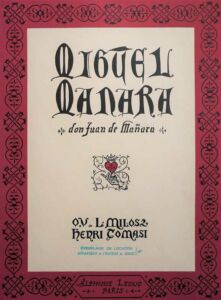
Two great figures will be honored in 2027: the historical figure of Don Miguel Mañara and the writer Oscar Milosz, author of the dramatic masterpiece Miguel Mañara.
Thanks to this coincidence of dates, we propose to create the conditions for a major musical event: the co-production in several European countries of one of the great French operas of the 20th century, composed by Henri Tomasi: Miguel Mañara (Don Juan de Mañara).
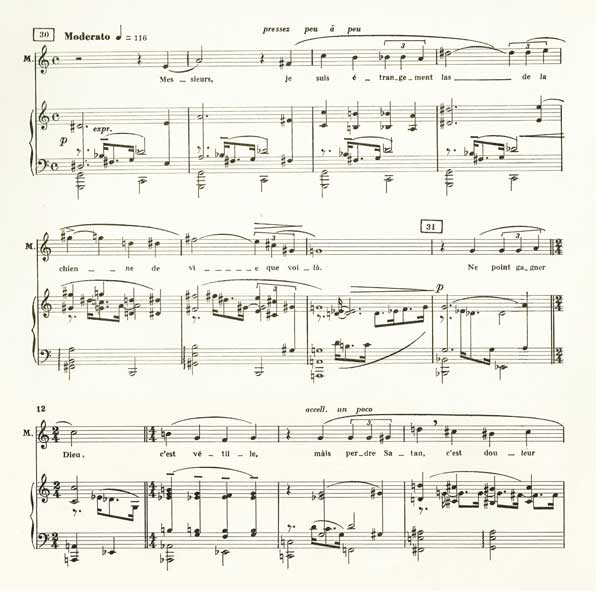 Act I, 1
Act I, 1
An exceptional context
The year 2027 will see the conjunction of a double commemoration that may concern several European countries. In fact, it will coincide with the 400th anniversary of Don Miguel Mañara’s birth (1627-1679), and the 150th anniversary of the birth of Oscar V. de L. Milosz (1877-1939), who made this historical figure the protagonist of his most famous theatrical work.
Founder of the Santa Caridad, a charitable institution still active in Seville, Don Miguel Mañara was wrongly considered by Romantic writers as the historical model for the mythical Don Juan. Following this model, Oscar Milosz brought a striking portrait of a Don Juan transfigured by love. From Milosz’s dramatic masterpiece, Miguel Mañara, French composer Henri Tomasi (1901-1971) created another masterpiece, his opera Don Juan de Mañara.
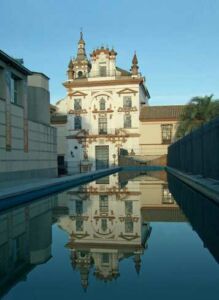
Santa Caridad Hospital, Seville
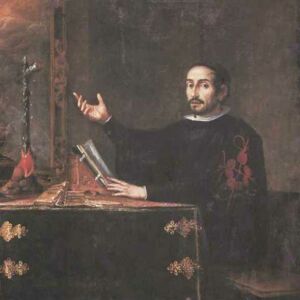
Portrait of Don Miguel Mañara by Juan de Valdès Real
A reference of Sevillian culture, now inseparable from its literary and theatrical incarnations, the figure of Mañara remains very present today, not only in his native country but also in several European countries. Translated into many languages, including Polish as early as 1919, Milosz’s play contributed to this notoriety, particularly in Italy where its reception for more than half a century has been characterized by an unwavering enthusiasm. As for Oscar Milosz himself, cousin of the Polish Nobel laureate Czesław Miłosz, this immense French-language poet was also a diplomatic representative of Lithuania in France from 1920 to 1939.
In this capacity, he is considered an essential actor in the independence of the young Republic of Lithuania after World War I. It should be added that, as a polyglot poet from the fringes of Europe, whose mother tongue was Polish and who translated from Russian, English and German, Oscar Milosz came from an old Polono-Lithuanian family on his father’s side and was of Polish Jewish descent on his mother’s side, and was the grandson of an Italian opera singer from La Scala in Milan. According to one of his contemporaries, Oscar Milosz was “the most beautiful gift that Europe has made to France“.
If we recall that Munich was the site of the triumphal world premiere staging of Tomasi’s Don Juan de Mañara in 1956, then potentially six European countries – France, Spain, Lithuania, Italy, Poland, and Germany – could be involved in the recreation of the opera.
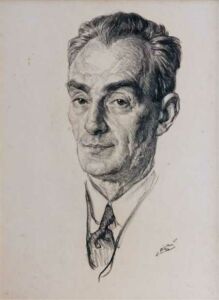
Portrait of Oscar Milosz by André Aaron Bilis
The lyrical drama of Tomasi: a masterpiece
Miguel Mañara, Don Juan de Mañara, a lyrical drama in 4 acts and 6 tableaux, based on the Mystery by of O.V. de L. Milosz, was composed by Henri Tomasi between 1941 and 1944, partially in Marseille and at the Sainte-Baume Monastery where he was contemplating becoming a monk.
His admiration for Milosz’s text was such that, while necessarily abbreviating it, he respected both its structure and its letter and the spirit: not a word is outside the poetic genius of Milosz. The result is a libretto of rare beauty in the Opera repertoire.
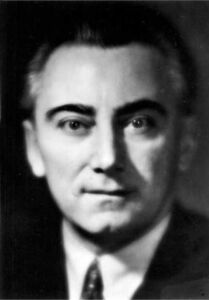 Portrait 1949 (Arriat photo)
Portrait 1949 (Arriat photo)
As for the music, the work was created (in concert) at the Théâtre des Champs-Elysées in November 1952. The day after the creation, one of the most eminent and undisputed figures of the Radio, Paul Gilson, director of artistic services for French Radio from 1946 to 1963, wrote this about it: “Do I need to tell you how much your success has delighted me? I am all the happier because I find your score to be a beauty worthy of the work that inspired it. I loved your Don Juan de Mañara whose music is now inseparable from Milosz’s Mystery. »
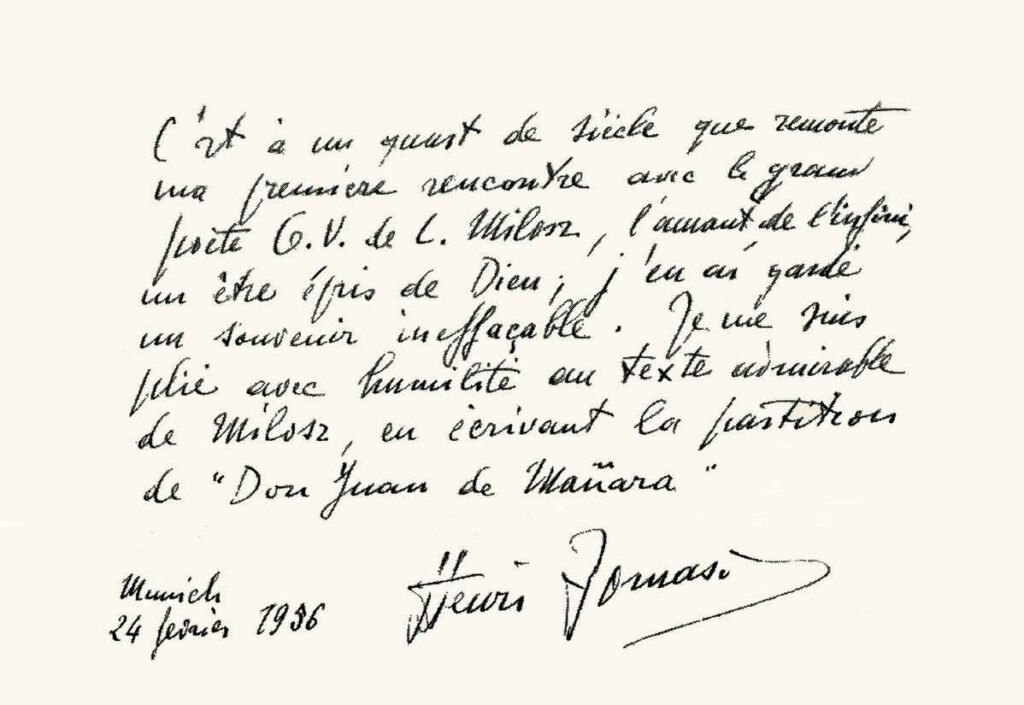
The recording made at that time was engraved 40 years later on CD, rewarded as a Grand Prize from the Academy of Records in 1992, and highly praised on television by Eve Ruggieri. In the CD presentation booklet, Jacques Bourgeois, a major critic from the 1950s to the 1980s, highlighted: “Don Juan de Mañara is undoubtedly a work of theater as much as music, and as such, it is probably the only great French opera written since the war, along with Poulenc’s Dialogues of the Carmelites.”
It was eventually at the Munich Opera – and in a German translation – that this lyrical drama was premiered on stage on March 29, 1956. Not to mention the presence of the French Ambassador to Germany, Louis Joxe, and broadcast on the R.T.F. and Bavarian Radio.
It was clearly qualified at that time as “a European event”, bearing witness culturally to the beginnings of the Franco-German reconciliation policy.
The work was subsequently revived in Brussels at the Théâtre de la Monnaie (1958), at the Teatro Nacional de São Carlos in Lisbon (1965), and finally in France, in Mulhouse (1967), Tours (1981), Nantes (1984), Marseille (1988), and Limoges (2002 and 2006), accounting about forty performances on stage and in concert.
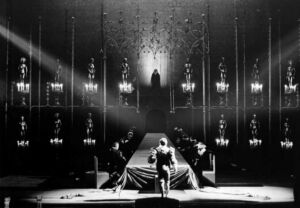 Munich Opera – 1956 – directed by Rudolf Hartmann
Munich Opera – 1956 – directed by Rudolf Hartmann
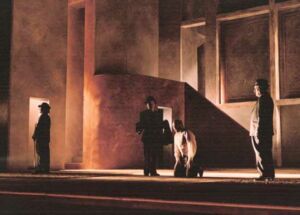 Marseille Opera – 1988 – directed by Charles Roubaud
Marseille Opera – 1988 – directed by Charles Roubaud
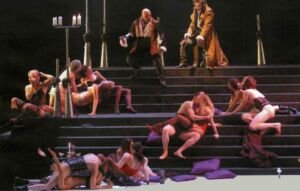 Limoges Opera – 2006 – directed by Filip Forgeau
Limoges Opera – 2006 – directed by Filip Forgeau
Implementation of the project
It involves working towards bringing together several opera houses, at least two of which could co-produce, obviously starting with France, which would be the ideal setting. France should play the driving role in a re-creation that would pay tribute to one of its great 20th century opera composers, whose one too often overlooks the stage work.
Associating a great French opera theatre, the Lietuvos nacionalinis operos ir baleto teatras of Vilnius, the Maestranza Theatre in Seville, the Teatro alla Scala in Milan, the Teatr Wielki – Opera Narodowa of Warsaw and the Bayerische Staatsoper in Munich in the production and/or distribution would not only make sense in light of the points of convergence outlined earlier. It also would highlight the reality of a common European culture, particularly in the powerful connection between a literary myth and musical theatre.
Seeking support from Europe, for example through programs such as Erasmus+ or Creative Europe, seems as logical as it is necessary for the economic model of the project. A European consortium involving the various countries mentioned would have the capacity to carry out this grand, ambitious project, emblematic of the highest cultural values of our continent.
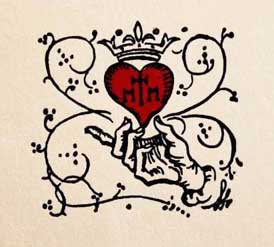
Current project leaders
The Henri Tomasi Association, whose founder is the composer’s son, Claude Tomasi-Solis, promotes the synergy of various potential actors of the achievement. He wrote the first biography about his father.
Since 1966, The Friends of Milosz French Association has been fulfilling the mission of promoting the work of Oscar Milosz. Its current president, Olivier Piveteau, wrote and published a doctoral thesis in comparative literature, a sum of knowledge dedicated to the character of Mañara (Paris-Sorbonne, 2003).
Musicologist Frédéric Ducros-Malmazet, a professor at CY Cergy Paris University and specialist of the composer since 1985, has been particularly involved in defending this work, paying tribute to it in L’Avant-Scène Opéra in 1988 and obtaining its first world recording from Forlane in a 2-CD box set that he designed. He is the author of a thesis entitled “Henri Tomasi in the mirror of his correspondence” (Sorbonne, 2016).
Christophe Bennet, an associate researcher at IREMUS, co-organized the 2nd Henri Tomasi Colloquium at the Sorbonne in 2021, after having already participated as musicologist in the first colloquium, as part of Marseille, European Capital of Culture 2013. His knowledge of European mechanisms will allow him to ensure, within the Henri Tomasi Association, the engineering of writing and monitoring the financing files.

Website : https://www.amisdemilosz.com / Contact : olivierpiveteau@orange.fr

Website : https://www.henri-tomasi.fr / Contact : ctomasi@club-internet.fr
***
Appendix 1
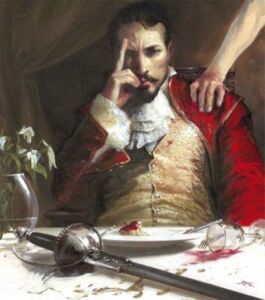
In the 17th century, a Spanish nobleman Miguel Mañara judges himself to be the worst man the Earth has ever borne.
Lust, deception, murder threw him into limitless solitude and despair.
At the heart of this nothingness, the young Girolama will then embody the breath of absolute love giving everyone the chance of accomplishment through self-abandonment.
But the death of this luminous being will take Mañara beyond what he could imagine…
Throughout this opera, the soul and the flesh become songs to make us hear and feel the unspeakable beyond the void that follows our most extreme experiences.
When love is no longer a quest but a source, the finite becomes the infinite.
Présentation de Julien Girardet
***
Appendix 2
DON JUAN DE MAÑARA BY HENRI TOMASI
by Emile Vuillermoz
« The french musical Journal » – May 3, 1956
A very beautiful tribute has just been paid to contemporary French music by the management of the Munich Opera. Superintendent Rudolf Hartmann has just produced, in conditions of unparalleled perfection, a work by Henri Tomasi entitled Don Juan de Mañara and this creation has achieved considerable success.
Milosz’s poem, imbued with sincere mysticism, is written in a style of extraordinary nobility and grandeur and in a language of striking originality and relief. This text inspired its musician to create a direct and gripping score, free from any technical bias, obeying the sole suggestion of the verb or the situation, using all the melodic, harmonic, rhythmic and instrumental resources available to a composer. from 1956, knowing his profession thoroughly and not shying away from any boldness in writing when the action demands it. A virtuoso of orchestration thanks to his long experience with the baton, Tomasi has created a fresco of astonishing richness of colors and offering mixtures of timbres of happy audacity.
Constantly lyrical, drawing from the human voice all its emotional content and from the instruments all their power of pictorial suggestion, the score of Don Juan de Mañara is a model of the genre testifying to the intact vitality of musical theater. French music has just been honored in Munich in a dazzling way.
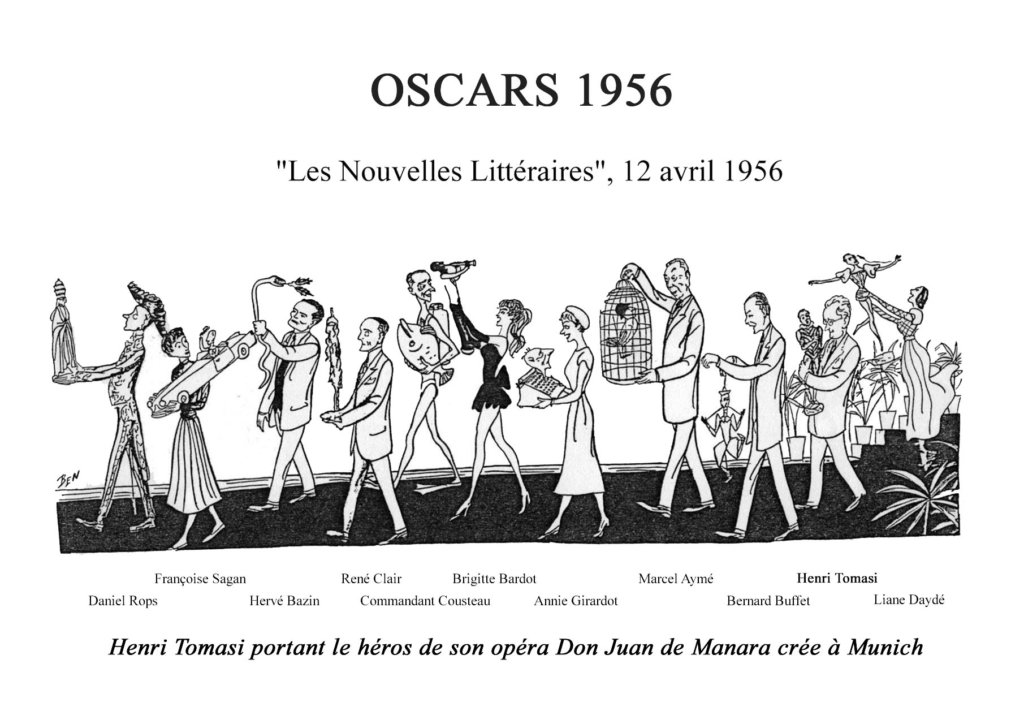 ***
***
Appendix 3
The Plot
The scene is Seville in the year of our Lord 1656.
ACT I
First Scene: The Feast. Don Jaime Castle.
Most of the guests are drunk on wine… The lights are dying… Dawn is near… “Ah! How can we fill this gulf in life? “, exclaims Miguel Mañara. “You will go to mass on Sunday and you will meet Girolama, a noble girl, very sweet, very wise and very beautiful”…, advises Don Fernand, old friend of the seducer’s father. …A shadow parts a curtain and appears to Miguel Mañara: “I am the shadow of your past life”…
Second Scene: The garden of Girolama.
First meeting of Miguel and Girolama. Girolama’s purity completely transforms Miguel Mañara. He confesses his love to her. She agrees to marry him.
ACT II
Third Scene: The vigil of Girolama.
Three months later. Girolama is dead, lying on a small white bed without flowers. Four candles are burning. Immobile, Miguel Mañara is crouching in a dark corner of the room. While the spirits dialogue with each other, the Spirit of Heaven is with Miguel Mañara and invites this “Son of the Earth” to live… The Corpus Christi night procession on Maundy Thursday passes under the windows…
ACT III
Fourth Scene: The Confession. — Parlor of the Convent of La Caridad in Seville.
After confessing his bad life before his meeting with Girolama, Miguel Mañara falls to his knees: “It is the fire of the Lord that consumes me, my Father.” — “Get up, I’m going to have your cell prepared,” said the abbot to Miguel Mañara, praying in ecstasy.
Fifth Scene: The Miracle. Easter Sunday in Seville.
Joyful crowd leaving the church, Miguel Mañara, now F. Mañara, performs a miracle. The people prostrate themselves and kiss their robes.
ACT IV
Sixth Scene: Death. — Courtyard of the Convent of La Caridad. — Sky strewn with stars. — The day is coming.
Frère Miguel appears, a lantern in his hand… He is very old… He prays… The Spirit of the Earth appears to him and shows him in vain the love of this world. Br. Mañara raises his hands and recites some verses from the Holy Book. The Spirit of Heaven calls him… “Here I am”…, replies Frère Miguel who dies.
***
Appendix 4
HENRI TOMASI
Don Juan de Mañara (1944)
Lyric drama in 4 acts based on L. Milosz’s Mystery of O.V.
History
CONCERTS ET RECORDINGS
- The 1st world concert performance took place on November 6, 1952 at the Théâtre des Champs-Elysées in PARIS, where it was later recorded and broadcast. The Orchestre National de la Radiodiffusion-Télévision Française was conducted by Henri Tomasi. With Raoul Jobin (Mañara), Martha Angelici (Girolama), Jacqueline Brumaire (Spirit of Heaven), Bernard Demigny (Spirit of Earth), André Vessières (Don Fernand, l’Abbé, Frère Jardinier), Paul Cabanel (Melendez), Joseph Peyron (Don Jaïme et 2ème religieux), Henry Vermeil (reciter). T.F. choirs conducted by Yvonne Gouverné. Presentation by Bernard Gavoty. – This recording, recorded on CD and published (Forlane UCD 16652 -16553), won a Grand Prix from the Académie du Disque Lyrique in 1992.
- In concert on March 22-23, 1953, in ANGERS. The orchestra of the Société des Concerts Populaires d’Anger was conducted by Henri Tomasi. Same performers as at the 1952 premiere, except for Mañara (Roger Barnier) and l’Esprit du Ciel (Briant).
- A 2nd recording took place on January 21, 1954 in PARIS. Radio-Lyrique Orchestra conducted by Henri Tomasi. With Roger Barnier (Mañara), Martha Angelici, André Vessières, J. Peyron, Lucien Lovano (Melendez), Geneviève Moizant (Spirit of Heaven), Jacques Doucet (Spirit of Earth). RTF choirs, conducted by Yvonne Gouverné.
- In concert on December 6, 1954, in PARIS, Orchestre Pasdeloup, conductor H. Tomasi (…)
- 3rd recording on January 21, 1955 in ROTTERDAM, Philharmonic Orchestra, conducted by Eduard Flipse – With Raoul Jobin, Christiane Jacquin (Girolama), Larren, Ketelaars, Willemsen, Larseen… – Broadcast on Radio-Hilversum on March 1 1955 (acts 1 and 2) and March 8 (acts 3 and 4).
- Concert with 4th public recording took place on April 3, 1958 in PARIS at the Théâtre des Champs-Elysées. Orchestre National, conducted by Henri Tomasi; Choeurs RTF, conducted by René Alix. With Jacques Bouet (Mañara), M. Angelici, A. Vessières, Simone Couderc, P. Cabanel, Germain Ghislain, Xavier Depraz, Louis Rialland, Marcel Lupovici.
- In concert with 5th recording on April 3, 1969 at the Maison de la Radio in PARIS. Radio broadcasts on France-Culture on June 6, 1969, and on March 12, 1971 in tribute to the composer after his death. Orchestre Lyrique de l’ORTF conducted by Pierre-Michel Le Conte. With Michel Caron, A.-M. Blanzat, André Vessières, Liliane Guitton, Frantz Petri, Jacques Villisech, Gérard Friedmann. ORTF opera choirs conducted by Jean -Paul Kreder.
- In concert on April 30, 1969 at the Opéra de MARSEILLE. Orchestre des Concerts Classiques conducted by Pierre-Michel Le Conte. With Giuseppe Todaro (Mañara), Colette Herzog (Girolama), Suzanne Sarroca, Frantz Petri, Frank Schooten, Michel Hubert, Francis Dresse, Pierre Héral. Choirmaster Jeno Rehak.
SCENIC PRODUCTIONS
- The 1st world performance took place on March 29 1956 at the MUNICH Opera House, in German, translated by Dr. Peter Funk. It was broadcast on R.T.F. and Bavarian Radio. At least eight performances took place in 1956. Stage direction by Prof. Rudolf Hartmann; sets by Helmut Jürgens. Soloists, chorus and orchestra of the Munich Opera conducted by André Cluytens. With Bernd Aldenhoff (Mañara), Magda Gabory, Marianne Schech, Josef Metternich, Kieth Engens, Max Proebstls, Hans H. Nissen. The triumphant premiere took place in the presence of the French Ambassador to Germany, Louis Joxe.
The recording was partially recorded on a CD released in September 2015 (MYTO, 2 CD 00336).
- The 1st performance in French took place on May 17, 1958 at the Théâtre Royal de la Monnaie in BRUSSELS. Directed by Jean-Jacques Etcheverry, set design by Roger Broe, musical direction by René Defossez. With Jacques Bouet (Mañara) (…)
- The next stage production took place on February 25 and 27, 1965 at the San Carlos Theatre in LISBON, with musical direction by Jean Fournet. Stage direction by U. Reinhardt, sets by Alfredo Furiga. With Denise Duval (Girolama) and Jacques Bouet (Mañara), Francis Dresse (tenor).
- The 1st performance in France took place on March 3, 1967 at the Théâtre de MULHOUSE (subsequent performances on March 4, 5 and 7). Musical direction by Reynald Giovannetti, sets by Eugène Fuchs. With Michel Caron (Mañara), Anne-Marie Blanzat (Girolama), Frantz Petri.
- Performed January 30, 1981 (and February 1) at the Théâtre de TOURS. Stage direction by Jean-Jacques Etcheverry, sets by Jacques Maillot. Directed by Guy Condette. Jean Kriff (Mañara), Anna-Maria Miranda (Girolama), Louis Hagen-William, Jacques Villisech.
- Performances on April 15, 17, 19, 21 1984 at the Opéra de NANTES. Orchestre Philharmonique des Pays de la Loire, conducted by Guy Condette. Stage direction by Jean-Jacques Etcheverry. Sets and costumes by Jean Maillot. Performers: André Jobin (Mañara) André Jobin (Mañara), Andrée Esposito (Girolama), Michèle Herbé (Spirit of Heaven), Louis Hagen-William (l’Abbé), Alain Charles (Spirit of Earth), Melendez (Patrick Meroni), Didier Henry (Frère Jardinier and 1st religious), Jacques Villisech (Don Fernand), (Jean-Guy Henneveux (Don Jaïme and 2nd religious).
- New stage premiere on May 15, 1988 at the Opéra de MARSEILLE (subsequent performances on May 17, 19 and 21). Stage direction by Charles Roubaud, sets by Bernard Arnould, costumes by Katia Duflot. Musical direction by Serge Baudo. With Ramon Alonso Gonzalez (Mañara), A.-M. Blanzat, Pierre Thau, Françoise Garner, Patrick Meroni, Gérard Serkoyan, Jean Brun, Gérard Friedmann.
- New production February 1, 2002 at the Grand Théâtre de LIMOGES. Grand Théâtre orchestra, choir and ballet conducted by Guy Condette. Scenic and stage design by Robert Mercier. With Jean Goyetche (Mañara), Rima Tawil (Girolama), Jean-Philippe Biojout (Esprit de la Terre), Brigitte Antonelli (Esprit du Ciel), Patrice Berger (Melendez), Paul Medioni (l’Abbé et Don Fernand), Vincent Bertrand (Frère Jardinier et 1er religieux), Dominique Rossignol (Don Jaïme et 2ème religieux).
- New production January 27 and 29, 2006 at the Opéra-Théâtre de LIMOGES. Opéra orchestra and choir conducted by Dominique Dournaud. Stage direction by Filip Forgeau. Sets by Christophe Delaugeas. Costumes by François Siméon. With Jean Goyetche (Mañara), Chantal Dionne (Girolama), Jean-Philippe Biojout (Esprit de la Terre), Brigitte Antonelli (Esprit du Ciel), Patrice Berger (Melendez), Paul Médioni (L’Abbé et Don Fernand), Gérard Théruel (Frère Jardinier and 1st religious), Dominique Rossignol (Don Jaïme and 2nd religious).
From 1952 to 2006, Tomasi-Milosz’s opera was performed some 40 times (2/3 in theaters) in 4 European countries (in addition to France).
